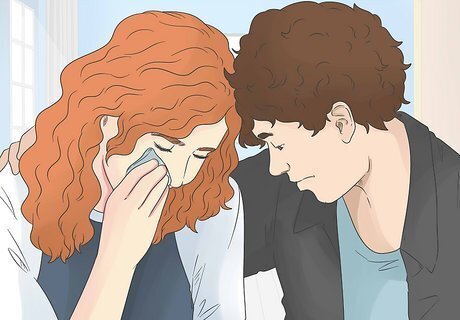
views
Is change healthy in a relationship?

Yes, change is a necessary (and unavoidable) part of every relationship. Just as you personally are always growing and changing, so is your relationship. While this can be scary, change can be a good thing because it helps you move on to the next stage in your relationship. You’re building a deeper connection by getting to know each other better and growing more comfortable with each other. You might experience small changes, like your partner getting a new hobby or you getting a new job. On the other hand, you could experience big changes, like your partner wanting to delay having kids or your job moving to a new city. Try to focus on the good changes in your relationship. For instance, you might feel more comfortable around your partner. Similarly, you can probably count on them when you need help.

Every relationship has its ups and downs. You might feel insecure about change, but a rough patch is usually temporary. What you’re experiencing is totally normal, and it doesn’t mean your relationship is in trouble. For instance, loss of libido is really common and doesn’t mean your relationship is in trouble. Similarly, it’s also normal for your partner to need alone time and to have their own friends.
Reasons Why Relationships Change

The initial honeymoon stage is exciting but short-lived. When you first fall for someone, you’re infatuated, so everything about them seems wonderful. However, this phase of a relationship is short. As you learn more about your partner, you’ll get a more well-rounded view of them. It might feel like they’re changing, but you’re just getting to know them better. It’s easy to overlook your partner’s flaws at first. However, no one is perfect, and you’ll eventually find things about them that annoy you. This doesn’t mean your relationship is over. In fact, it’s the first step to a stronger relationship. Infatuation usually lasts between 18 months and 3 years. As it wears off, it’s normal for your relationship to change.

Every relationship goes through phases. In the beginning, you’re fascinated by your partner and can’t get enough of them. As time goes on, you learn more about each other and figure out if you’re compatible. Over time, a successful couple will develop a deep, lasting friendship that allows them to build a life together. You might not have as much sexual passion for each other in a long-term relationship. However, you’ll likely have a deep emotional connection that newer couples don’t have.

Stress from life events also changes relationships. Stressors like job loss, moving, or a death in the family can take a toll on your relationship. Similarly, having a baby can strain even the happiest relationships. Don’t despair because your relationship can get better if you talk to your partner about how you feel. Tell your partner, “We’ve both been struggling since the baby was born. I miss having time for just us. Can we cuddle and talk during the baby’s nap today?” You could also say, “The move has been so exhausting. I feel like we’re both snapping at each other. I think we should take a break one evening this week and have a date night to reconnect.”
Is it normal for feelings to fluctuate?

Yes, it’s common for feelings of love to come and go. We all want to feel a connection with someone, and it’s easy to fall hard and fast. You may realize later that you just had a physical connection with someone or that you got caught up in a fantasy. In some cases, you might feel like your love is fading, only to have it come surging back. If your feelings are fading, focus on your commitment. As long as you’re committed to each other, you can get through anything.
When is change in a relationship a problem?

You’re starting to feel bored in your relationship. What you’re going through is super common because all relationships get boring at times. You’ve probably fallen into a predictable routine or are spending a little too much time with your partner. Mix things up a bit to get back some of your initial spark. Try these fun ideas: Visit a new restaurant. Go on a double date with friends. Take a cooking class together. Start a new hobby together. Exchange a secret or story you haven’t told each other before. Go on a day trip or weekend getaway.

Your partner starts to control you. You need and deserve your independence, so it’s absolutely a problem if your partner is controlling. You’re probably feeling really conflicted about what to do, but it may be best for you to rethink your relationship. Here are some signs your partner is being controlling: They expect you to do things you don’t want to do. They isolate you from your family and friends. They stop you from doing things that make you happy. They won’t let you talk to people. They make you feel guilty.

Abuse is always a problem. In the beginning of your relationship, your partner may have seemed perfect. It can be really hard to accept that they’re treating you poorly when you have such positive memories to look back on. At the same time, abuse is never okay, and you deserve a partner who treats you well. Abuse can by physical, verbal, emotional, or sexual, and all forms of abuse are bad.
How do you deal with change in a relationship?

Be flexible so changes feel more comfortable. Although change can be scary, try to remember it’s also a good thing. Every relationship has ups-and-downs, and being open to change helps you have a stronger relationship. Be willing to compromise on things that don’t threaten your core values and needs. For example, your partner might want to attend night classes, which means you see them less. You might make this sacrifice so they can work toward their goal. On the other hand, your partner might decide they don’t want children, while you do. In this case, you shouldn’t have to compromise because this is a core need for you. If you’re struggling, talking to a counselor can help. They’ll help you work through your feelings and learn better ways to cope.

Do a weekly relationship check-in so you’re communicating well. Communication is key to a healthy relationship, so set aside time to talk. Share how you’re feeling, and listen to what your partner has to say. Good communication will help you strengthen your bond so you can get through anything together. For instance, you might set aside time before bed every Thursday night to discuss how you’re both feeling and what challenges you're both facing right now. Offer each other support because you’re in this together. Start the conversation by saying something like, “This week, I’ve felt a little distant from you, but I’m hoping we can get close again. How are you feeling this week?” or “Lately, I’ve noticed we’re being intimate less often. I was hoping we could spice things up. How are your feeling about our intimacy?”

Focus on building a friendship with your partner. As your relationship grows, you likely won’t have the same physical spark as you did in the beginning. Hopefully, you’ll have a deep, lasting friendship that helps your love endure. Additionally, being friends with your partner can actually increase your feelings of attraction over time. Spend time together having fun. Find mutual interests you can do together. Share your day-to-day experiences and be there for each other. Support each other in your goals.
How do you know when a relationship is over?

It might be over if you’re uncomfortable with your partner. You’ve probably put a lot of work into this relationship, so you may be reluctant to walk away. If you’re feeling uneasy in the relationship, however, it might be time to move on. Listen to what your heart—and head—are telling you. You might try taking some space to think about what you want to do. Spend a few days with your friends and see if you miss your partner. If you feel a sense of relief being away from them, it might be time to call it quits.

You might end things if you have nothing in common. In the beginning of a relationship, you’re typically more focused on attraction. Over time, things like mutual interests and shared values become more important. You could be drifting apart because you’re very different people. Here are some signs you and your partner are good for each other: You have similar values. Your long-term goals align. You feel respected and valued. You communicate openly and honestly. You can be yourselves around each other. You can solve conflicts. You trust them to be there for you in times of need. You’ve introduced each other to family and friends. You spend time together and apart. You support each other in pursuing your goals.




















Comments
0 comment